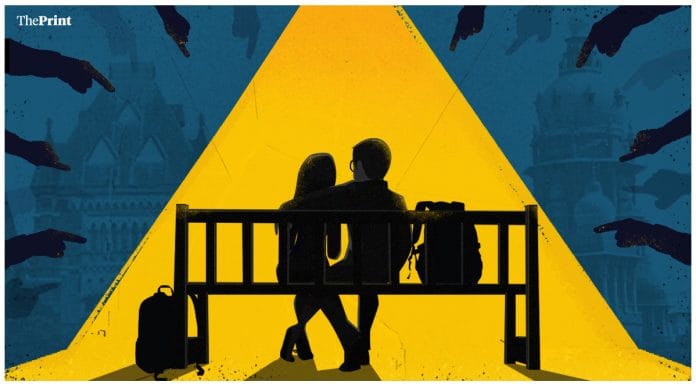New Delhi: The Supreme Court this week invoked special powers under Article 142 of the Constitution to set aside a Tamil Nadu man’s POCSO conviction, saying it was a case “where the law must yield to the cause of justice”.
K Kirubakaran was sentenced to 10 years of rigorous imprisonment under Protection of Children from Sexual Offences (POCSO) Act and five years under the erstwhile Indian Penal Code. But between his trial court conviction and the Supreme Court hearing, Kirubakaran married the woman, whose father had filed the complaint. The couple now has a son less than a year old.
The Supreme Court’s ruling reignites a longstanding debate—should India’s child protection law apply to consensual adolescent relationships?
ThePrint had reported in August that the Supreme Court is examining whether the age of consent under POCSO should be brought down from 18 to 16 years, in response to a Public Interest Litigation.
While the Centre is opposed to this change, senior advocate and amicus curiae Indira Jaising has urged the court to lower the age of consent, arguing that POCSO unfairly criminalises consensual relationships between teenagers.
The case and SC order
The bench of Justices Dipankar Datta and Augustine George Masih quashed both convictions, reasoning that further incarceration would cause “irreparable harm” to the wife, child and society at large.
“The crime,” the bench observed, “was not the result of lust but love.”
The decision was shaped by what the court termed unique circumstances: The woman, once identified as the ‘victim’, filed an affidavit expressing her wish to continue her marital life. She declared her dependence on her husband and her desire to lead “a happy, normal, and peaceful life” with him and their child.
Her father, who had filed the original complaint, did not object to quashing the criminal proceedings. The Tamil Nadu State Legal Services Authority also confirmed to the Bench the couple was leading a “happy married life”.
Though the top court quashed the convictions, it warned that Kirubakaran must not desert his wife and child, and must maintain them for life with dignity. Any failure, the bench said, could invite “consequences not too palatable for the appellant”.
The case reached the Supreme Court after a lengthy legal process.
Convicted by a trial court in Tamil Nadu, Kirubakaran appealed the decision to the Madras High Court. In May 2021, while the High Court appeal was pending, Kirubakaran married the woman. Four months later, in September 2021, the High Court upheld his conviction. He then appealed to the Supreme Court.
Also Read: More and more POCSO cases are being settled by victim-accused marriages
Article 142 and ‘complete justice’
Article 142 of the Constitution empowers the Supreme Court to pass any decree or order necessary to do “complete justice” in a case before it. This extraordinary provision allows the court to transcend procedural or statutory limitations when a strict application of law would result in inequity.
While it is not meant to override legislation, the power serves as a constitutional safety valve “to avoid situations of injustice being caused by the rigid application of law”.
Over the years, the Supreme Court has invoked Article 142 to settle complex matrimonial disputes, regularise irregular appointments, and prevent manifest injustice. For instance, the top court in April this year turned to this provision to declare that bills indefinitely delayed or reserved for the President by the Tamil Nadu Governor were deemed to have received assent. This order, the court had noted, was to ensure the integrity of the legislative process.
In the Kirubakaran case, the bench acknowledged that, as a rule, convictions under POCSO cannot be quashed merely because of compromise or subsequent marriage. Yet, it reasoned, Article 142 exists precisely to meet situations where rigid adherence to law would produce manifest injustice.
Citing the philosophy of Justice Benjamin Cardozo of the US that “the final cause of law is the welfare of society”, the bench declared that law must sometimes “yield to the cause of justice”.
“The administration of criminal law,” the judgment said, “cannot be divorced from practical realities.”
The larger question
The POCSO Act, enacted in 2012, criminalises all sexual activity with persons under the age of 18 regardless of consent. It was designed as a stringent protective measure against sexual exploitation of children. But its broad sweep has increasingly drawn criticism for ensnaring teenage couples and young adults in criminal prosecutions where there was no coercion or abuse.
The Supreme Court made it clear that its order was based on the unique facts of the Kirubakaran case and should not serve as a precedent. Yet the judgment has drawn attention to POCSO prosecutions involving consensual relationships.
Courts across India have been divided on how to balance the law’s protective intent with social realities.
Earlier in May, in the In Re: Right to Privacy of Adolescents, the Supreme Court withheld execution of a POCSO sentence where the parties were in a long-term consensual relationship. But it reaffirmed that consent is immaterial under the law.
Two months earlier, in March, another bench of the Supreme Court quashed POCSO proceedings after the accused married the complainant and the couple had settled into family life. The court reasoned that continued prosecution would amount to “unnecessary harassment”.
Not all courts have taken the same stand.
The Bombay High Court’s Nagpur bench in 2023 ruled that marriage to a survivor does not erase criminal liability or “shield” the accused under POCSO. The court reiterated that minors cannot legally consent to sex and that the statute’s protective object must prevail.
This judicial divergence, based on the varied facts of each case, underscores a policy tension—should the law’s protective rigidity give way to the courts’ recognition of lived realities? The debate, it appears, is far from over.
(Edited by Prerna Madan)
Also Read: From child protection to ‘moral policing’ tool: How POCSO Act is leaving courts conflicted






